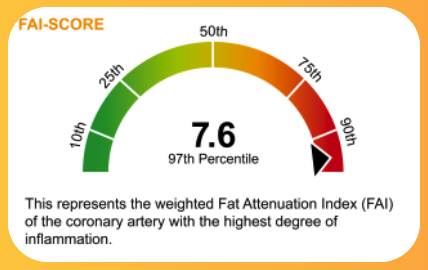New AI Technology Can Predict Cardiac Events Due to Coronary Inflammation 10 Years in Advance
Images

Caristo Diagnostics Limited announced the results of a landmark clinical study published in The Lancet that support the ability of Caristo's CaRi-Heart AI technology to quantify coronary artery inflammation and accurately predict cardiac events.
This landmark study, titled "Inflammatory risk and cardiovascular events in patients without obstructive coronary artery disease: the ORFAN multicenter, longitudinal cohort study," analyzed results from the first 40,000 patients enrolled in the "ORFAN" registry, the world's largest study that evaluates coronary computed tomography angiography (CCTA) imaging biomarkers in predicting long-term cardiovascular outcomes.
Key study findings include:
- Among patients undergoing CCTA, more than 80% did not have obstructive coronary artery disease (CAD) at the time of imaging, but twice as many fatal and non-fatal cardiac events occurred in that group
- Coronary inflammation, as measured by Caristo's CaRi-Heart FAI-Score, predicted fatal and non-fatal cardiac events (including heart attack and new heart failure), independently from traditional risk factors, routine clinical CCTA interpretation, calcium scoring and plaque quantification, at least 10 years in advance
- Even among the 50% of patients who had no or minimal coronary plaque at the time of the initial CCTA, those with the most abnormal FAI-Score results experienced a 9.5-fold higher risk for cardiac mortality and 5.5-fold higher risk for major adverse cardiac events (MACE)
- Caristo's AI-Risk model, CaRi-Heart Risk Score, outperformed other scores in routine clinical use for prediction of cardiac mortality, and when presented to clinicians, resulted in changes of management decision in 45% of the patients. Most changes were due to clinicians' decision to target the previously undetected coronary inflammation.
"The ORFAN study is an expanding global registry which will include long-term clinical and outcome data for 250,000 patients from around the world, and we are very pleased to publish these initial results," said Keith Channon, MD, Professor of Cardiovascular Medicine at the University of Oxford, Caristo's Chief Medical Officer, and co-author of The Lancet publication. "Coronary inflammation is a crucial piece of the puzzle in predicting heart attack risk. We are excited to discover that CaRi-Heart results performed exceptionally well in predicting patient cardiac events. This tool is well positioned to help clinicians identify high-risk patients with seemingly 'normal' CCTA scans."
Ron Blankstein, MD, Professor of Medicine and Radiology at Harvard Medical School, Director of Cardiac Computed Tomography at Brigham and Women's Hospital, and co-author of the publication, commented: "This study, which represents one of the largest studies in the field of CCTA, has important implications for the field of preventive cardiology. I am excited about the potential of the FAI-Score biomarker, which has promising prognostic value beyond existing CT-based methods such as plaque, calcium scoring, and CAD-RADS based interpretation."
The study underlines the need for a robust risk prediction tool that can identify vulnerable patients with inflamed coronary arteries, particularly in those without obstructive CAD. This approach would transform CCTA from a test used to triage a minority of patients for further intervention into a prevention tool that guides management for all patients undergoing CCTA.
The CaRi-Heart technology is in clinical use in the UK, European Union, and Australia.